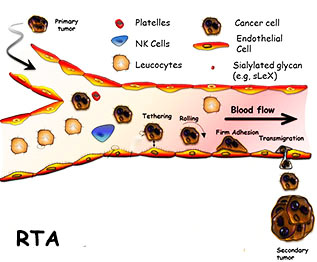Undergraduate Research Experience
Physics of Cancer and Glycobiology
My research interests are two merge two areas of research that have independently demostrated promise in undertanding cancer metastasis, specifically glycobiology and the biophysics of cancer metastasis. Cancer remains the second major cause of deaths in the USA. The diagnosis of cancers such pancreatic, lung, colon, and ovarian are a death sentence mainly because of the failure
to detect them before the metastatic stage (1). Metastasis is an intricate process where
cancer cells separate from the primary tumor, enter the circulatory system and through their journey encounter thermal, kinetic, mechanical, and chemical forces before they colonize distant organs (Fig 1). Research progress depends on an integrated approach, combining tools from diverse disciplines spanning from biology, the physical sciences, to bioengineering.
Figure 1. Metastasis. Millions of cancer cells enter the vasculate with the end goal of reaching a secondary site. However, only a unique set of cancer cells carrying specific glycoproteins and glycoconjugates will reach their goal and proliferate.
Glycobiology, the study of glycoconjugates and their binding partners, has expanded our understanding of the underlining nature of metastasis. We now know that there is a significant correlation between certain types of altered glycosylation and the actual prognosis of tumor-bearing animals or patients (6). Steadily, in vitro cellular assays support the notion that these post-translational modification changes are critical to aspects of tumor cell behavior and certain glycan structures are well-known markers for tumor progression. However, progress has been slow due to the complexity of glycans and the lack of new technology to study them.
Glycoengineering (GE) is a relative new field that deals with the structural modification of glycans. GE can be metabolic, metabolic glycoengineering (MGE), where non natural sugar analogs are used to alter the glycome in a global manner. Another relative new subdivision of glycoengineering is Chemoenzymatic Glycoengineering (CGE) which implements enzymes to quantitatively and specifically modify glycoconjugates in living cells. Together, MGE and CGE, complement each other and become a powerful set of techniques to investigate the different roles of glycoconjugates in health and disease.Undergraduate Research Projects
During my time at ARC, I plan to focus my research efforts in three projects. Students interested in either of these project should contact me at almaraz at ucdavis.edu. You must be an ARC student and have taken
one of my classes.1) Glycoprotein 3D Modeling
2) Physics of Cancer
3) Glycoengineering
Web Site is UNDER CONSTRUCTION… please be patient as we update our site

